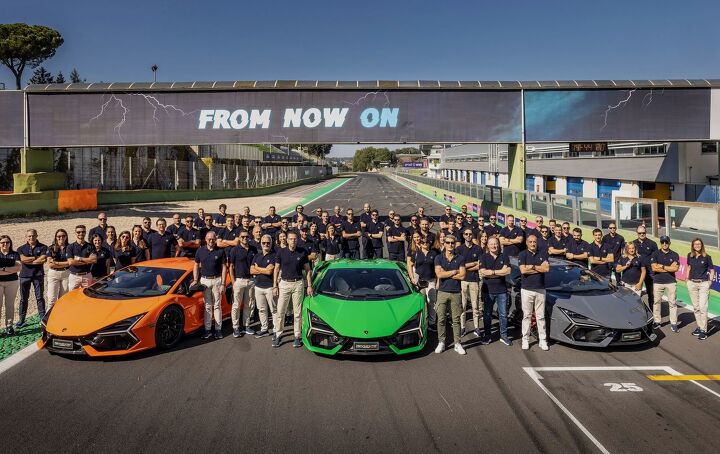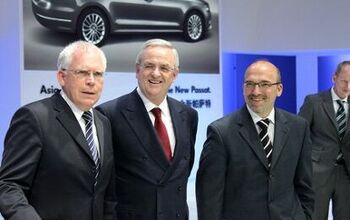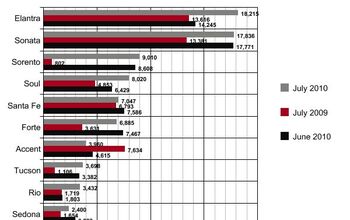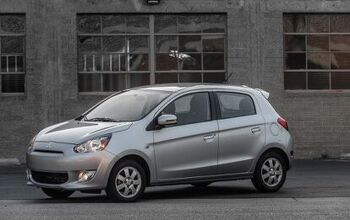Lamborghini Breaks Historic Sales Record

Lamborghini has broken its own sales record by delivering over 10,000 automobiles in 2023. While that’s still less than mainstream manufacturers are pushing out the door in a given week, it represents a major shift in how the brand does business and will likely open it up to additional regulatory scrutiny.
Sales were primarily driven by the Urus, with 6,087 vehicles delivered, and the Huracán, boasting 3,962 units. Analysts have suggested that something like this may not have been possible a decade ago. But with global wealth being transferred upward in recent years, Lamborghini was afforded an opportunity to draw in additional customers with its entry level products. Though, despite these being Lamborghini’s most affordable models, both the Huracán and Urus retail well above $200,000.
From Lamborghini:
The distribution of vehicles delivered was balanced in the three macro-regions, with EMEA showing a 14 [percent] increase over 2022 with a total of 3,987 cars, immediately followed by Americas with a 9 [percent] increase (Total: 3,465) and APAC up 4 [percent] (Total: 2,660). In detail, the United States continued as the top market with 3,000 cars delivered, followed by Germany (961), Chinese Mainland, Hong Kong and Macau (845), the United Kingdom (801), Japan (660), the Middle East (496), South Korea (434), Italy (409), Canada (357), Australia (263), France & Monaco (255), Switzerland (211), Taiwan (131) and India (103).
In terms of model split, the continuing success of the Urus Super SUV was confirmed (6,087 vehicles delivered), followed by another notable record for the Huracán, of which 3,962 cars were delivered. In addition, 63 cars equipped with the iconic V12 were delivered, including the last 12 Aventadors and 51 Few-Offs.
“It’s a true source of pride for the whole company to have surpassed the 10,000-car delivery mark. Playing a role in achieving this milestone for Lamborghini is an honor for me and for all the people who work tirelessly to achieve this goal,” stated Stephan Winkelmann, Chairman and CEO of Automobili Lamborghini. “This is a success made possible by the commitment of everyone, a major accomplishment based on true teamwork. But as always, we’re not stopping at single milestones, and we’re ready to take on more exciting new challenges in 2024.”
While the sales are good news for the brand, breaking the 10,000-unit barrier could come with some complications. The European Union had previously considered allowing specialty, low-volume manufacturers leeway when it comes to adhering to ever-tightening emissions rules. But it has started to move away from the scheme and is still planning to force all manufacturers to stop building everything but all-electric vehicles by 2035. While companies building fewer than 10,000 vehicles annually weren’t subject to the same emissions standards as the big boys, they’re still supposed to prepare for electrification if they want to continue doing business in Europe.
A subset of boutique manufacturers have attempted to convince the EU to rethink the plan by offering exemptions to low-volume brands on the grounds that their products aren’t transportation products but mobile works of rolling art. The premise is that they’re different from mainstream automobiles and should be treated as such.
“We create art pieces that exist for 100 years or more, so they’re not mass-production cars you throw away after 15 years,” Donkervoort Automobielen Managing Director Denis Donkervoort said early in 2023. “We know this because more than 99 [percent] of the cars we’ve ever built are still drivable, and we know this because we still service them.”
Donkervoort and a handful of other low-volume manufacturers are hoping to get around European regulations that would force them to halve CO2 emissions by 2030 and go fully electric by 2035. But they’re targeting an indefinite exemption for automakers building fewer than 1,000 vehicles per year, which wouldn’t pertain to Lamborghini even if it stopped selling the Urus tomorrow.
The theory here could be applied to companies like Lamborghini, however. Boutique brands have alleged that they produce vehicles in such small quantities that the overall carbon footprint is minuscule. Though the kind of people that buy those products are likely to have a much larger impact on the environment than your neighbor who drives an Honda CR-V and won’t need to heat a 10,000 square-foot mansion or fuel the private jet they also don’t own.
Regardless, Lamborghini now sells enough cars to put itself into a different category unless industry regulators are swayed by corporate lobbying efforts. But the Italian brand has fielded several all-electric concepts in recent years and has claimed 2024 will represent its first big push into transitioning its fleet to EVs, now that the time it allotted itself as a “celebration of the internal combustion engine” has concluded.
[Image: Lamborghini]
Become a TTAC insider. Get the latest news, features, TTAC takes, and everything else that gets to the truth about cars first by subscribing to our newsletter.

A staunch consumer advocate tracking industry trends and regulation. Before joining TTAC, Matt spent a decade working for marketing and research firms based in NYC. Clients included several of the world’s largest automakers, global tire brands, and aftermarket part suppliers. Dissatisfied with the corporate world and resentful of having to wear suits everyday, he pivoted to writing about cars. Since then, that man has become an ardent supporter of the right-to-repair movement, been interviewed on the auto industry by national radio broadcasts, driven more rental cars than anyone ever should, participated in amateur rallying events, and received the requisite minimum training as sanctioned by the SCCA. Handy with a wrench, Matt grew up surrounded by Detroit auto workers and managed to get a pizza delivery job before he was legally eligible. He later found himself driving box trucks through Manhattan, guaranteeing future sympathy for actual truckers. He continues to conduct research pertaining to the automotive sector as an independent contractor and has since moved back to his native Michigan, closer to where the cars are born. A contrarian, Matt claims to prefer understeer — stating that front and all-wheel drive vehicles cater best to his driving style.
More by Matt Posky
Latest Car Reviews
Read moreLatest Product Reviews
Read moreRecent Comments
- Tassos Under incompetent, affirmative action hire Mary Barra, GM has been shooting itself in the foot on a daily basis.Whether the Malibu cancellation has been one of these shootings is NOT obvious at all.GM should be run as a PROFITABLE BUSINESS and NOT as an outfit that satisfies everybody and his mother in law's pet preferences.IF the Malibu was UNPROFITABLE, it SHOULD be canceled.More generally, if its SEGMENT is Unprofitable, and HALF the makers cancel their midsize sedans, not only will it lead to the SURVIVAL OF THE FITTEST ones, but the survivors will obviously be more profitable if the LOSERS were kept being produced and the SMALL PIE of midsize sedans would yield slim pickings for every participant.SO NO, I APPROVE of the demise of the unprofitable Malibu, and hope Nissan does the same to the Altima, Hyundai with the SOnata, Mazda with the Mazda 6, and as many others as it takes to make the REMAINING players, like the Excellent, sporty Accord and the Bulletproof Reliable, cheap to maintain CAMRY, more profitable and affordable.
- GregLocock Car companies can only really sell cars that people who are new car buyers will pay a profitable price for. As it turns out fewer and fewer new car buyers want sedans. Large sedans can be nice to drive, certainly, but the number of new car buyers (the only ones that matter in this discussion) are prepared to sacrifice steering and handling for more obvious things like passenger and cargo space, or even some attempt at off roading. We know US new car buyers don't really care about handling because they fell for FWD in large cars.
- Slavuta Why is everybody sweating? Like sedans? - go buy one. Better - 2. Let CRV/RAV rust on the dealer lot. I have 3 sedans on the driveway. My neighbor - 2. Neighbors on each of our other side - 8 SUVs.
- Theflyersfan With sedans, especially, I wonder how many of those sales are to rental fleets. With the exception of the Civic and Accord, there are still rows of sedans mixed in with the RAV4s at every airport rental lot. I doubt the breakdown in sales is publicly published, so who knows... GM isn't out of the sedan business - Cadillac exists and I can't believe I'm typing this but they are actually decent - and I think they are making a huge mistake, especially if there's an extended oil price hike (cough...Iran...cough) and people want smaller and hybrids. But if one is only tied to the quarterly shareholder reports and not trends and the big picture, bad decisions like this get made.
- Wjtinfwb Not proud of what Stellantis is rolling out?


































Comments
Join the conversation
You couldn't GIVE me one of those over-hyped over-priced Lambo-Goonies.
Tesla Model Y first EV to be Europe's No. 1 seller | Automotive News Europe (autonews.com)
Speaking of EPIC sales records by an automaker who was just an upstart joke, barely on the radar screen, 12 years ago.
Oh, and you can bet I am the REAL Tassos, not the coward identity thief punk vegetating around here.